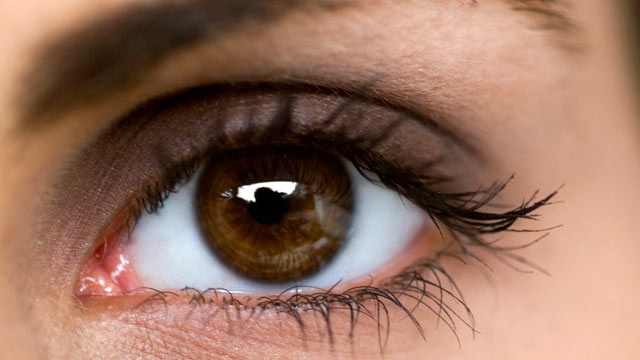http://abcnews.go.com/Health/writing-eyes-researchers-make/story?id=16861469

The researchers developed a system that allows users to write in cursive on a video monitor using only their eyes. Dr. Jean Lorenceau of the Universite Pierre et Marie Curie in Paris has developed a method for translating eye movements into writing on a screen, and by doing so has simultaneously advanced possibilities for patients and solved a tricky puzzle posed by biology. The results are in today's issue of the journal Current Biology.
Lorenceau's device overcomes a difficult physiological problem called saccadic eye movements. If you try to move your gaze smoothly across a stationary object, you will will instead find your eyes "saccading," or jumping from one point to another. So-called smooth-pursuit eye movements are reserved by our bodies for following moving objects. This is normal, but presents problems for researchers trying to devise methods of eye writing, just as a constantly jerking hand would severely hamper someone trying to write with a pen.
Dr. Lorenceau's technique bamboozles the body's own circuitry by using a flickering screen. It tricks the brain into thinking the eyes are following a moving object. The device then uses known eye motion-detection technology to translate these movements into smooth cursive writing, fully controlled by the subject.
Other devices for communicating solely with the eyes do exist. They're less ambitious -- they let a user select choices from a menu in sequence rather than write -- but Lorenceau says they work well. However, he points out that users' ability to create something themselves is unique to his device.
"Maybe more important is the fact that cursive eye writing provides personal and creative means of expression," Lorenceau said. Furthermore, it allows people to achieve shades of meaning not available on a menu. "What if the figure you wish to draw is not in this repertoire," he said, "[such as] the drawing of a heart to indicate you love something?"
Lorenceau has just been selected by the French National Research Agency to partner with a physician caring for ALS patients in developing his device further, as well as a company to continue to develop the device and a programmer to develop software for cursive eye writing recognition.
But Lorenceau sees uses for his device beyond helping those unable to write on their own. "A training program could be helpful for children with oculomotor deficits or [even] athletes [or] artists and is therefore not necessarily exclusively to be used by patients unable to move their limbs," he said. "Although speculative, these ideas will be tested in the near future."

No comments:
Post a Comment
Note: Only a member of this blog may post a comment.